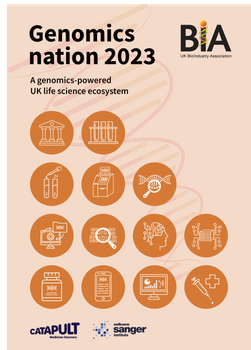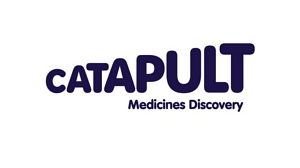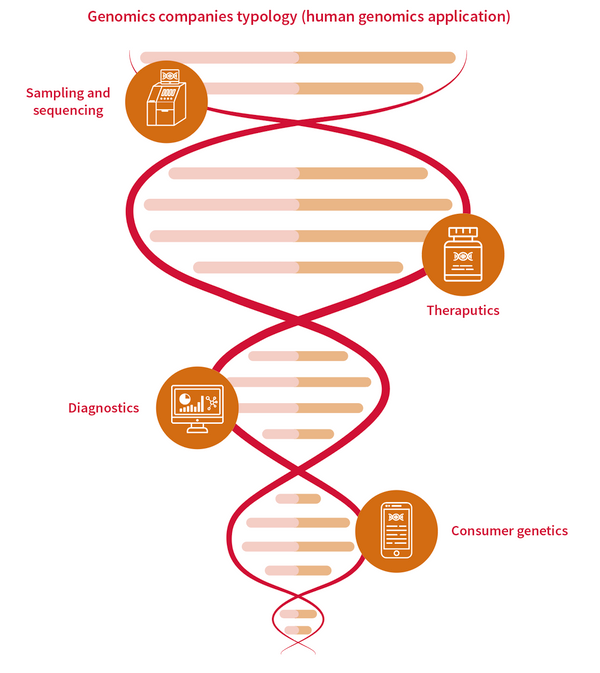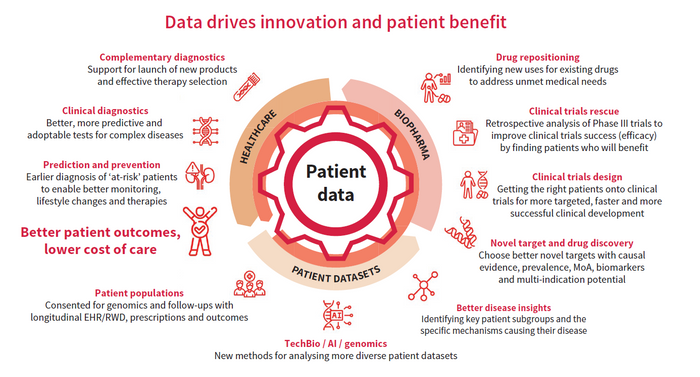A genomics-powered UK life science ecosystem

The UK’s genomics sector stands at an important inflection point. It has already become world-leading, building upon the heritage of Franklin, Watson, Crick, and later the Human Genome Project, delivered by the Wellcome Sanger Institute around the year 2000 and most recently the 100,000 Genomes Project delivered by Genomics England. Now, with more start-ups and scale-ups in the genomics space than ever before, we are on the cusp of this technology becoming one that is embedded within our healthcare system to improve patients’ lives: ensuring we are a real genomics nation.
There exists a tendency to group all genomics companies under one umbrella and therefore obscure the wide range of innovations that they offer. Working at the intersection of biology and data science, these companies unlock the human genome, applying their findings to the diagnosis and treatment of disease. Genomics has applications across healthcare, from the initial process of sequencing, through diagnostics to AI-enabled drug discovery. Linking these processes up will deliver immense benefits for patients, facilitating preventative and personalised medicine which will form the backbone of the NHS of the future.
Genomics is also driving another revolution, one linked to combatting climate change and contributing to sustainable living, by applying this science to the planet itself. While this report focuses on the healthcare applications of genomics, many of the same technologies and companies featured are enablers of this new genomics dimension.
This is the third Genomics nation report published by the BIA, allowing us to chart the growth of the sector over time. Our 2021 report provided a benchmark, finding that UK genomics had a market cap of £5 billion, projected to reach £50 billion by 2040. In 2022, the second report demonstrated the youth of the sector, with half of the companies at the early or seed stage, before identifying the skill gaps that need to be filled for UK genomics to mature.
This report returns to the theme of growth this year. UK genomics is rich in academic expertise and pioneering SMEs, but to retain its status as a genomics superpower, we must ensure that SMEs can scale up. Access to data and opportunities to collaborate are essential ingredients for a thriving ecosystem which this report focuses on.
For more information, please get in touch:
In collaboration with:


Forewords

"The UK’s dynamic genomics industry is thriving and stands to benefit both patients and taxpayers as it continues to grow. We possess a vibrant ecosystem of spin-outs, scale-ups, and SMEs that are developing and scaling innovations poised to enhance health and wellbeing, not just in the UK but worldwide. I hope this report helps demonstrate not only their strengths but also the strength of the UK ecosystem in which they are thriving." - Steve Bates OBE, CEO, BIA
This report is published days after the world’s largest collection of full human genomes was published. UK Biobank is a British success story that puts us at the heart of a key global technology of this century. Set up 20 years ago, the charity UK Biobank recruited half a million altruistic volunteers to create the world’s most comprehensive source of health data.
It can now be used by researchers across the world, from academic, commercial, government and charitable settings, for scientific discoveries that improve human health.
Professor Sir Rory Collins FRS FMedSci, Principal Investigator, of UK Biobank captured the importance of the project well when he said: “Scientists are looking at UK Biobank like Google Maps when they want to know what are the pathways from lifestyle, environment, genetics to disease, they don’t go Google, they go to UK Biobank.”
UK Biobank now provides the most detailed picture of human health that exists, equipping researchers with the ultimate toolbox to make previously out-of-reach links and discoveries about disease development possible.
But the UK’s capability and opportunity in genomics go far, far beyond Biobank and we have many, many more assets – both in the public sector and in our burgeoning private sector including fantastic small and medium-sized enterprises. The large-scale application of this technology is reshaping both healthcare and the pharmaceutical industry globally, accelerating our understanding of diseases and how to prevent and treat them, and there is a significant economic prize for whichever nation best captures the value of the new industry that will grow from exploiting this technology.
With the right investment, skilled professionals, and partnerships within the NHS ecosystem, UK genomics SMEs are perfectly positioned to be key players in one of the fastest-growing areas of global biotech and life sciences, delivering economic growth to the country at the same time as health insight to the globe. That’s why innovative genomics companies are so important to our nation’s life science industry. If I have one regret about the way the UK Biobank’s £200-million effort was structured, it was that not enough thought was given to potential industrial strategic benefits of finding a way of enabling UK SMEs to be on the inside of this project alongside academic and large pharmaceutical companies from the outset.
This is an opportunity that would not have been overlooked in competitor dynamic economies like Singapore or Israel. But with the proliferation of health data assets, such as Genomics England, Our Future Health and UK Biobank, there will be many more chances to enable UK genomics SMEs to access UK-funded data first within a secure, reliable, and trustworthy framework.
Accessing this data is the lifeblood of, and sustainable competitive advantage of, many genomics companies, enabling them to develop better drugs, reach more accurate diagnoses more quickly, or identify specific predispositions. Being able to access and use large datasets is key to enabling UK SMEs grow and compete in the burgeoning global market for genomic products and services.
The UK’s dynamic genomics industry is thriving and stands to benefit both patients and taxpayers as it continues to grow. We possess a vibrant ecosystem of spin-outs, scale-ups, and SMEs that are developing and scaling innovations poised to enhance health and wellbeing, not just in the UK but worldwide. I hope this report helps demonstrate not only their strengths but also the strength of the UK ecosystem in which they are thriving.

"The UK’s wealth of genomics data provides a foundation and fertiliser for an increasingly rich and diverse set of companies across data science, diagnostics and an increasing range of advanced drugs. Genomics nation 2023 calls out the need for easier access to this data for commercial SMEs, academics, and health researchers. Our SMEs are key to how innovation is delivered, pioneering new products, services, and assets that benefit us all. However, to seed and scale up, these young companies need help to gain easier commercial access to consented datasets.
This report shares some notable progress, but without a faster flow of data, our ability to learn and use the language of biology will remain in academic cloisters whilst our global competitors march past us. If that happens, we have failed UK patients and our sector. We need an acceptance that commercial R&D is beneficial to patients and our bioeconomy, not an attempt to exploit something from them. We must work together to deliver smoother pathways to ethical data access for our innovators – all of whom are driven by a shared purpose." - Professor Chris Molloy, CEO, Medicines Discovery Catapult
This third edition of the Genomics nation report looks forward to the future of how increasingly complex genomic data will be used, and by whom. It calls out the need for easier data access for commercial SMEs, as well as academics and health researchers. Our SMEs are a key source of how innovation is delivered, in the forms of new products, services and assets which benefit us all.
I thank our collaborators in this endeavour, the BIA, who campaign tirelessly for the good of the UK biotech sector and the excellent Sanger Institute, whose constant stream of invention and insight sharpens the cutting edge of the UK’s genomics blade, allowing us to cut through many of the thorniest barriers to progress.
The UK’s wealth of genomics data provides a foundation and fertilizer for an increasingly rich and diverse set of companies across data science, diagnostics and an increasing range of advanced drugs.
Data science companies are using genomics, protein or metagenomics data to ‘crack’ the language of biology. They are building fast from a basic lexicon to develop increasingly accurate predictive models of protein folding and interaction. But – pardon the pun – we are still at a relatively early ‘primer’ stage of reading. The development and future application of large language models (LLMs) by industry players will change that, enabling us to have a much more sophisticated understanding of what the genes are telling us about the biology they code for, in all its splendid complexity and variety.

"The UK is a trailblazer in the application of genomics, a lead built on visionary investment that established a strong science base here and enabled early links with the clinic. The ongoing dynamism of our genomic ecosystem, which creates and funds more genomics companies than anywhere else in Europe, is being powered by academic excellence, a unique health system, rich data resources and a genomic commercial sector that is reaching critical mass." - Dr Emmanuelle Astoul, Head of Translation, Wellcome Sanger Institute
The UK dominates the genomics industry sector in Europe and as reported in the previous Genomics nation report (2022), 1 the UK is a leader in both investment raised by the sector and in the number of genomics companies formed.
Furthermore, the strength of the UK genomics ecosystem was clearly demonstrated by how genomics technologies were deployed at scale to respond to a public health emergency during the COVID-19 pandemic. The COVID-19 Genomics UK Consortium2 (COG-UK) for example was rapidly assembled by bringing together academia, health services and public health agencies to monitor the evolution of the epidemic in the UK and track the emergence of variants.
If there was a poster child for how funding emerging technology and large scientific resources early can kick-start an industry, the genomic ecosystem in the UK should be in contention. At the root of the UK’s lead in this field, we find very early and bold investment – sustained over 30 years – that has generated fundamental genomic data as shared resources driven by the belief that this would power up science, technology and medicine. Ambitious vision and collaboration between academia, funders, health services and government in support of “big science” has enabled today’s successes.
A foundational event that kick-started genomics in the UK has been the landmark decision of the Wellcome Trust to accelerate the sequencing of the first human genome. In 1992, it established the Sanger Centre in Cambridge. The aim – to undertake the most ambitious project ever attempted in biology. This effort resulted in the first human genome published in 2000 with the Sanger Centre (now Wellcome Sanger Institute) 3 being the single largest contributor.
UK genomics ecosystem
Mapping the UK genomics ecosystem
Genomics companies do not fit neatly into a single category. Standing at the crossroads of biology, data science and AI, these firms delve into the various intricacies of the human genome. Their profound insights not only transform disease diagnosis and treatment but also span the vast expanse of healthcare, from the foundational steps of genome sequencing to the realm of AI-powered drug research. In this section, we examine the different types of genomics companies, the work they do, and the landscape in which they operate.
In this section, we examine the different types of genomics companies, the work they do, and the landscape in which they operate.

Health data assets
The genomic data lifecycle: patients, data banks and genomics companies
The genomic data lifecycle is a circular journey, beginning and culminating with the patient and the NHS. This journey underscores the importance of patient data in driving genomic innovations, personalised medicine, and in delivering improved health outcomes back to the patient.

At the outset, patients, in collaboration with the NHS, provide invaluable genetic and medical data. This data is the lifeblood of genomic research. However, before this data can be effectively utilised, it needs to undergo several crucial processes.
Health data banks and assets play an essential role in ensuring that patient data is collated, curated, and maintained at the highest quality standards. Additionally, they are guardians of patient privacy, ensuring that data is anonymised and consent is appropriately managed. They ensure that data remains reliable, consistent, and ethically gathered.
Genomics companies then engage with these data banks. Companies must navigate intricate processes of data access negotiations, sifting through vast datasets to find the precise data they require, and agreeing on terms that respect patient privacy, the objectives of the research, and commercial considerations.
From this data, genomics companies analyse, probe, and interpret genetic patterns and anomalies, striving to unearth new knowledge. The insights they derive pave the way for the development of innovative products and services. Whether it’s novel therapeutic interventions, improved drugs, or strategies for personalised medicine, these products and services are then channelled back to the starting point of our lifecycle: the NHS and its patients.
Collaborating for impact
Success stories from the genomics industry and its ecosystem
Genomics companies do not operate in a vacuum. Their success is reliant on collaboration with other actors within its ecosystem: the NHS, academia, data assets, pharma, other genomics companies, and government bodies.
In this section, we will showcase some of the cutting-edge collaborations that have taken place within this ecosystem and the positive health outcomes they created.
Health data, genomics and AI
The UK Government recognises the importance of AI and genomics to the UK economy and society. One of its stated aims is to become ‘the most advanced genomic healthcare system in the world’, and lists AI as one of five ‘critical technologies’ that can make the country a scientific superpower.
Major scientific challenges are already being tackled by AI and genomics, for example, using genomic sequencing to identify new COVID-19 variants or using machine learning AI to accurately predict the structure of proteins.
Collaboration with players outside of the traditional life science realm are also emerging. Ambitious initiatives are apitalising on the synergies emerging between big tech and biotech. AlphaFold for example, is the result of Google DeepMind and the research institute EMBL-EBI in Cambridge joining forces to solve the “50-year-old challenge” of predicting a protein structure from the sequence of individual amino acids that the protein is made from.
This powerful resource can now accurately predict the 3D structure of nearly all known proteins, i.e., approximately 200 million protein structures. It represents an exceptional collaborative breakthrough that will accelerate drug discovery as well as impact every area of biology research.
Some pharmaceutical companies, including GSK, adopted AI and functional genomics early and developed strong in-house capabilities.
The field has also seen multiple pharma partnerships and the impact of these collaborations are emerging. For example, Oxford-based Exscientia reported starting their first in-human study for an AI-designed molecule developed in collaboration with BMS.
AstraZeneca entered a multi-year target identification partnership with BenevolentAI which was expanded to new disease areas in January 2022 and recently published preclinical validation of a first target.
AI-centric collaboration is not limited to industry, however.
Genomics England has developed an unparalleled biodata resource of almost 150,000 whole genomes with corresponding phenotypic data from NHS patients with rare diseases or cancer. It is collaborating with the AI company Insitro to integrate histological information into its genomic and clinical datasets and create a powerful new “multimodal cancer data environment”.
Conclusion
UK genomics holds immense promise and is undergoing dynamic growth. The UK has shown itself to be a global leader in the field, standing on the pillars of public investment, academic acumen, innovative breakthroughs, and an ever-growing number of pioneering SMEs.
This report has shown that UK genomics is growing ever deeper roots. Our map of the ecosystem illustrated the varied and ever-growing diversity of the work of genomics companies. As documented in Chapter Four, this R&D is powered by the UK’s strong data assets, the bedrock of good genomics. This provides a picture of a flourishing sector; a national cluster of genomics expertise that feeds on its momentum, rivalling any cluster across the Atlantic.
Investment has the potential to drive the sector’s expansion still further. For instance, the unlocking of pension funds through the Mansion House Compact will provide a new avenue for institutional investment to reach scaling companies. Financial resources of this kind are pivotal for empowering genomics businesses, nurturing their progression from innovative start-ups to fully-fledged global competitors.
The cultivation of an investment friendly environment is therefore essential for the sustainable growth of the genomics industry in the UK.
Data quality and accessibility are two key factors shaping the future of genomics. The UK’s health data is a treasure trove for genomics, but there is a pressing need to enhance its accessibility to innovative SMEs. Strengthening our data infrastructure will not only aid in improving disease diagnosis and treatment but could also spark new waves of innovation within the sector.
Interdependence underscores the advancement of genomics, a sentiment that transcends the field to encourage collaborations with the tech sector. In particular, the emergence of AI-enabled Large Language Models (AI LLMs) for life sciences has introduced an exciting new dimension to genomics. By “reading” biology, AI LLMs can garner deeper insights from genetic information, uncovering hitherto unknown approaches to human health and disease.
At the intersection of genomics and technology lies functional genomics, an exciting new frontier for our field. By focusing on the dynamic aspects of the genome, functional genomics promises to unravel the complexities of gene interactions and their implications on patients’ lives. Linking genotype to phenotype in this way could have a transformative impact, paving the way for a genomics-enabled NHS providing personalised medicine.
Reflecting on the state of UK genomics in 2023, the road ahead should involve capitalising on growth opportunities, ensuring data accessibility, and promoting cross-sector collaboration. We stand on the cusp of a new era in genomics, propelled by emerging technologies, investment, and a maturing industry ripe for growth. The UK is not just a genomics nation – it is a nation poised to redefine the boundaries of genomics and healthcare, with a future that promises an integrated role for functional genomics and AI-powered insights.
In collaboration with:
.png)
.png)



